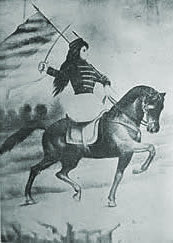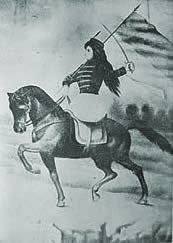
|
Women and Independence in Latin America An exploration of women's involvement in the Latin American Wars of Independence |

|

|
Women and Independence in Latin America An exploration of women's involvement in the Latin American Wars of Independence |

|
Gender:Female
Ethnic origen: White
Events:
| 1817 | - | Bahia | - | Not applicable | - | She was born on 1 December 1817 in Bahia. |
| 1852 | - | Rio de Janeiro | - | Unknown | - | She took over the editorship of the "Jornal das Senhoras" in Rio de Janeiro. |
| 1875 | - | Rio de Janeiro | - | Unknown | - | She died in Rio de Janeiro on 25 May 1875. |
Connections:
Editors newspapers and magazinesBiography:
Velasco was born in Bahia on 1 December 1817, the daughter of Diogo Soares da Silva Bivar, a member of the Imperial Council and the founder of the Conservatório Dramático do Rio de Janeiro, and Violante Lima de Bivar. As a young woman she moved with her family to Rio, where she lived for the rest of her life. There she married the naval lieutenant João Antônio Boaventura Velasco (Schumaher & Brazil, 521).
Precociously talented, she is said to have performed at soirees in Bahia from the age of eight (Muzart, 194). As well as possessing the musical and artistic skills typical of the education of the daughters of the elite at that time, Velasco was also proficient in French, Italian and English and translated a number of European plays, including, at the age of twenty, O xale de casemira verde, by Alexandre Dumas and Eugene Sue, which was accepted by the Rio Dramatic Conservatory. She also wrote critiques of dramatic works for her father’s Conservatory and was made an honorary member in recognition of these contributions (Muzart, 194). In 1859 she published Algumas traduções das línguas francesa, italiana e inglesa (Rio de Janeiro: Bernardo Xavier Pinto de Souza).
However, Velasco is best known for her journalistic career, which began in 1852 when she began to contribute to the Argentine Juana (Joana) Paula Manso de Noronha’s paper O Jornal das Senhoras. When Manso had to leave her position as editor after only six months, Velasco took over the role, editing the paper for a further year before financial difficulties also forced her to give up the paper (Muzart, 155). As editor, she concentrated on the spiritual values and emotional superiority of women and stressed the importance of women’s education for society. Two decades later she founded another women’s periodical, O Domingo, which ran from November 1873 until her death in May 1875.
She was also a friend of the poet Beatriz Francisca de Assis Brandão, who wrote a preface to a collection of translated texts published by Velasco in 1859. Velasco died in Rio on the 25 May 1875.
References:
Muzart, Zahidé Lupinacci (editor). (2000) Escritoras Brasileiras do Século XIX
Schumaher, Schuma and Brazil, Érico Vital (editor). (2000) Dicionário Mulheres do Brasil de 1500 até a atualidade
Blake, A V A Sacramento (1902) Diccionario Bibliographico Brazileiro
Hahner, June E (1990) Emancipating the Female Sex: the struggle for women’s rights in Brazil, 1850-1940
Vidal, Barros and Costa, Licurgo (1940) História e evolução da imprensa brasileira